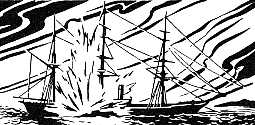|
The essential features of the successful submarine were beginning to take shape. Bushnell provided the screw propeller, Symons the ballast system and Fulton the torpedo.  These things were at last combined during our Civil War in a semi-submersible, steam-driven Confederate ship named the "David." Early in February, 1865, she sank the U.S.S. Housatonic at Charleston, South Carolina - marking the first warship to be destroyed by a submarine. The modern version is the work of two Americans - John Holland and Simon Lake. John Holland, like the previous inventors, saw in the submarine a new and effective weapon. He studied the unique boat while teaching in St. John's Parochial School in Paterson, New Jersey. In 1875 he built his first model but it was a failure, as practically all first models are. Not discouraged by this, he kept working, and six years later he made a successful demonstration to the Navy Department. |








